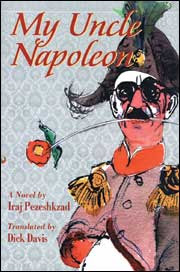It has been a quarter of unintended consequences, and one of those consequences is the almost snail pace at which i am progressing with OBOC. Got caught up with too many things that started off innocuously but led to a series of events that were completely unintended, that I couldn't find the time or the frame of mind to sit down and dig into a serious book.
I gave up Cities of Salt by Abdelrahman Munif which I picked as the book for Jordan. It is a great book and I loved the story of the Arabian world coming into collision with America and the impact of oil on Bedouins, but after 400 pages I wanted some closure, and this just wouldn't end! And then it was "A grain of wheat" by Nguigi Wa Thiongo, but gave that one up after 30 pages. I guess too much anti-colonial literature does get to you after all.
Then it was "One Day I will Write About This Place" by Binyavanga Wainaina, a memoir of the author's life in Africa that would've worked much better as a series of essays than as a book. Still I enjoyed the book and like a Christmas miracle managed to finish it, which given my recent track record is pretty remarkable! Although the story begins in Kenya, the memoir takes us through the author's time spent across Africa, especially South Africa, Ghana, Uganda and Togo.
Binayavanga through the memoir takes us through his early childhood, the school years, his struggles as a student in South Africa and later as a budding writer. Interwoven into his personal story is the story of the changing political landscape of Africa, and the struggles of the people. Many of the changes in Africa have been played out in front of a world audience especially the end of Apartheid, the Rwandan Genocide, the numerous dictators and their brutal reigns, the struggles of Sudan, but this book shows what it means to actually live through and experience those changes.
Although am not a big fan of the youtubish art of self-expression through comments, I do sometimes read the comments on the "Have your say" section of the BBC News website as I like to hear what the people from the region affected by what is otherwise just a headline for the rest of us have to say. This memoir was certainly a window into Africa in that sense and so it was worth reading just to get that perspective. One more book that proved how little I know of too many things. OBOC while an interesting project, has led me to writers i had never heard of, but i have to concede it has not really furthered my understanding of any country beyond the surface.
I gave up Cities of Salt by Abdelrahman Munif which I picked as the book for Jordan. It is a great book and I loved the story of the Arabian world coming into collision with America and the impact of oil on Bedouins, but after 400 pages I wanted some closure, and this just wouldn't end! And then it was "A grain of wheat" by Nguigi Wa Thiongo, but gave that one up after 30 pages. I guess too much anti-colonial literature does get to you after all.
Then it was "One Day I will Write About This Place" by Binyavanga Wainaina, a memoir of the author's life in Africa that would've worked much better as a series of essays than as a book. Still I enjoyed the book and like a Christmas miracle managed to finish it, which given my recent track record is pretty remarkable! Although the story begins in Kenya, the memoir takes us through the author's time spent across Africa, especially South Africa, Ghana, Uganda and Togo.
Binayavanga through the memoir takes us through his early childhood, the school years, his struggles as a student in South Africa and later as a budding writer. Interwoven into his personal story is the story of the changing political landscape of Africa, and the struggles of the people. Many of the changes in Africa have been played out in front of a world audience especially the end of Apartheid, the Rwandan Genocide, the numerous dictators and their brutal reigns, the struggles of Sudan, but this book shows what it means to actually live through and experience those changes.
Although am not a big fan of the youtubish art of self-expression through comments, I do sometimes read the comments on the "Have your say" section of the BBC News website as I like to hear what the people from the region affected by what is otherwise just a headline for the rest of us have to say. This memoir was certainly a window into Africa in that sense and so it was worth reading just to get that perspective. One more book that proved how little I know of too many things. OBOC while an interesting project, has led me to writers i had never heard of, but i have to concede it has not really furthered my understanding of any country beyond the surface.





